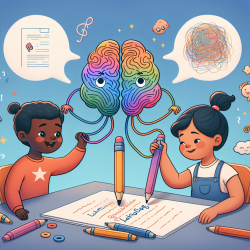Handwriting difficulties are a significant challenge for children with dyslexia, impacting their academic performance and self-esteem. Recent research titled "Evidence of Altered Functional Connectivity at Rest in the Writing Network of Children with Dyslexia" offers new insights into the underlying neural mechanisms contributing to these difficulties. This blog explores the findings of this study and discusses practical strategies for speech-language pathologists (SLPs) to enhance their intervention approaches.
Understanding the Research
The study conducted by Gosse et al. (2022) used resting-state functional connectivity (RSFC) to examine the brain's writing network in children with dyslexia (DYS) compared to typically developing (TD) peers. RSFC measures the functional connections between brain regions when the brain is at rest, providing insights into the brain's intrinsic functional organization.
Key Findings
The study revealed significant differences in RSFC between the graphemic/motor frontal area (GMFA) and other brain regions in DYS children compared to TD children. Notably, DYS children exhibited reduced RSFC in areas involved in:
- Spelling and phonological processing
- Motor control and graphomotor processes
- Emotional and behavioral regulation
These findings suggest that handwriting difficulties in DYS children are not solely due to spelling impairments but also involve disruptions in graphomotor and motor-related brain regions.
Practical Implications for SLPs
Based on these findings, SLPs can adopt several strategies to improve handwriting outcomes for children with dyslexia:
1. Integrate Multisensory Approaches
Incorporate multisensory techniques that engage visual, auditory, and kinesthetic modalities. For example, using sandpaper letters or writing in the air can help reinforce the connection between orthographic information and motor output.
2. Focus on Fine Motor Skills
Enhance fine motor skills through activities such as cutting, bead stringing, and playing with clay. Strengthening these skills can support better handwriting control and fluency.
3. Address Emotional Factors
Recognize and address the emotional and behavioral challenges that children with dyslexia may face. Incorporate positive reinforcement and create a supportive learning environment to reduce anxiety and build self-confidence.
4. Use Assistive Technology
Leverage assistive technology tools such as word processors with spell-check features and speech-to-text software to reduce the cognitive load associated with handwriting tasks.
Encouraging Further Research
While this study provides valuable insights, more research is needed to fully understand the origins of graphomotor impairments in dyslexia. SLPs are encouraged to stay informed about the latest research developments and consider participating in or supporting studies that explore innovative intervention strategies.To read the original research paper, please follow this link:
Evidence of Altered Functional Connectivity at Rest in the Writing Network of Children with Dyslexia.










